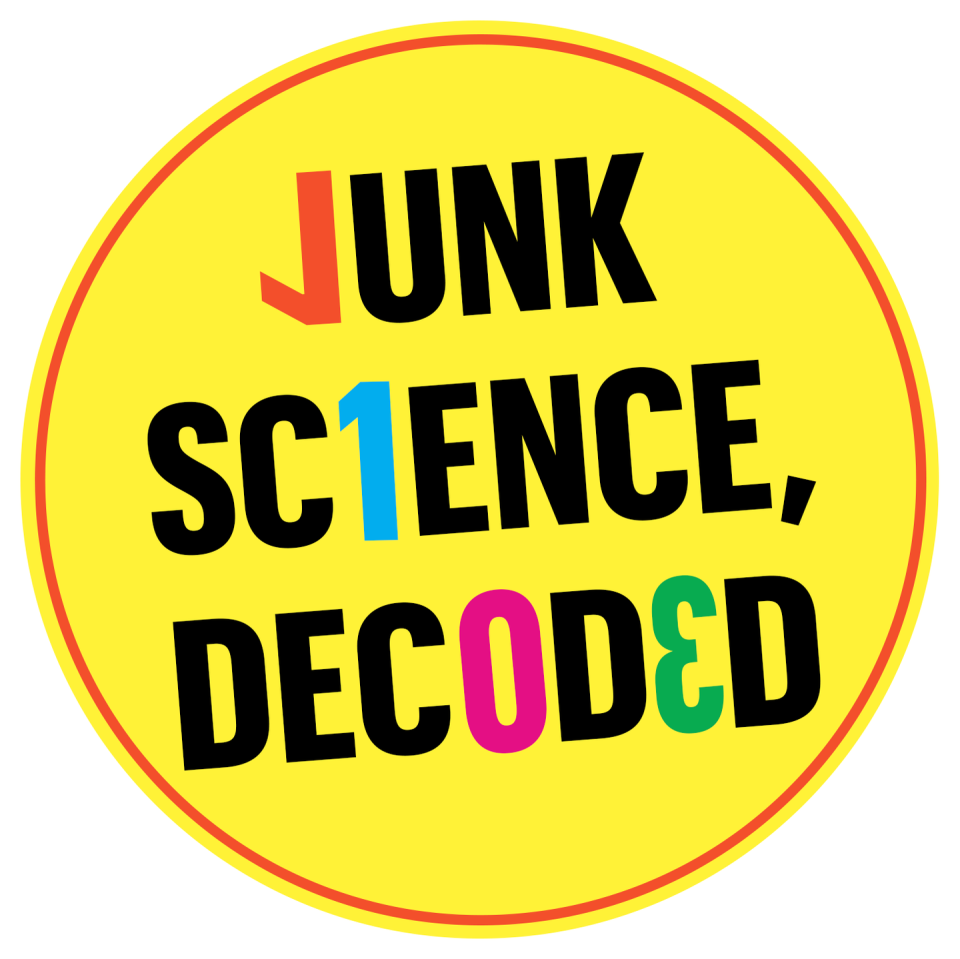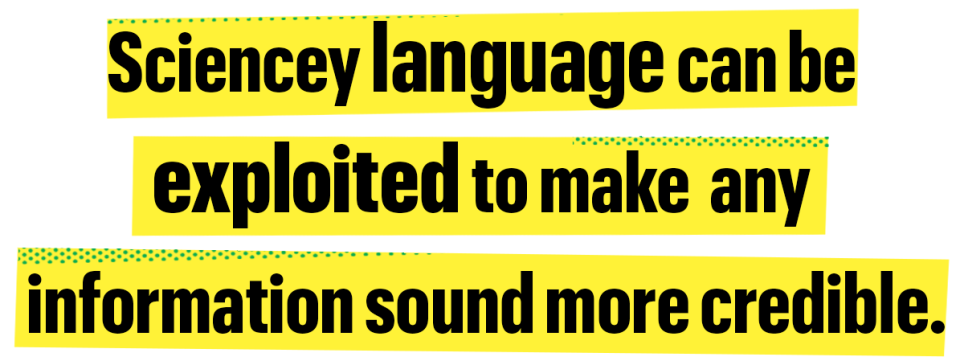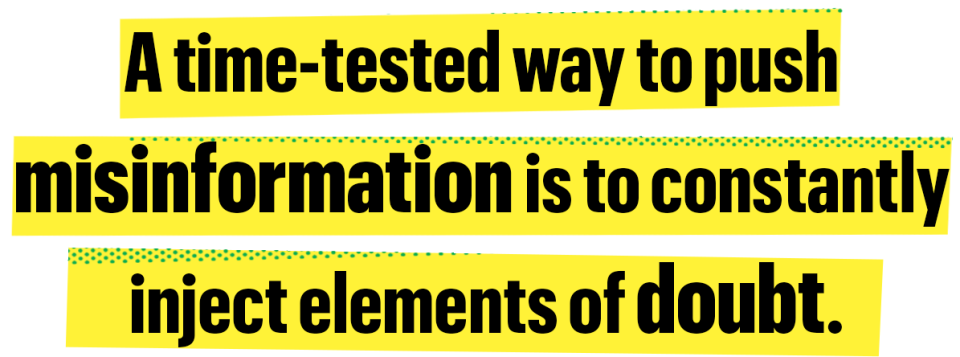9 Ways to Know if Health Info Is Actually Junk Science

"Hearst Magazines and Yahoo may earn commission or revenue on some items through the links below."

Science misinformation is now being spewed and shared at record rates. This is the second story in our 4-part Junk Science series that gets to the root of why it's happening and what you can do about it. To go deeper, check out: Part 1: The Golden Age of Junk Science Is Killing Us; Part 3: The Best (and Worst) Places to Find Reputable Health Information; Part 4: What You Can Say to Pull Someone Out of a Junk Science Rabbit Hole.
Yes, there are fraudsters and cranks out there trying to sell products and personal brands, but most people aren’t intentionally trying to pass along misinformation. Gordon Pennycook, Ph.D., is a cognitive psychologist at the University of Regina who studies how to battle the spread of misinformation. His research reveals that roughly 80 percent of people believe that it’s very or extremely important that the info they share on social media is accurate. However, it can be difficult to parse quality from quackery. What should you be considering when you see a blog comment, YouTube testimonial, or social-media rant from your loudmouthed uncle? Ask yourself these nine questions to help you figure out what the heck is true:
1. Is there evidence for this?
Be skeptical if a claim is based on a study that was done only in animals (if it’s not proven in your fellow humans, don’t bank on it), was small (in general, you need big studies—in thousands, not dozens, of people—to produce reliable results), or was only observational. (Observational studies mostly involve noting relationships between things, like eating a food and changing a disease outcome. These can’t really prove the food caused the change. For that, you need randomized, controlled studies, which give a treatment to one group and not another to zero in on whether it has an impact.)
Although it may be tempting to be swayed by exciting new research—especially if it’s contrarian in nature—it’s important to consider the body of peer-reviewed evidence, meaning other scientists have checked it (a common practice before research is published), and to look at the broader scientific consensus. You might even want to make sure there’s science referenced at all. A report or post that simply pontificates should be viewed as less pertinent than something relying on, you know, actual evidence.
2. Is the evidence preliminary?
While scientific speculation can be a valuable way to publicly debate emerging ideas, peer review adds much-needed oversight and credibility. During the pandemic, there has been dramatic growth in access to “preprint” papers—previews of studies that have not been reviewed by independent scientists or accepted for publication in an academic journal. Unfortunately, they often get reported on or shared without the important “this is just a preprint” caveat. For example, a preprint about the alleged benefits of the anti-parasite medication ivermectin in treating or preventing Covid helped drive interest in the drug. But after questions were raised about possible data manipulation, it was pulled from the preprint website. As is so often the case, however, the idea was out, and the narrative of benefit continues to circulate. While the peer-review process isn’t perfect, it’s a valuable tool. If you can’t find the study in an academic journal, be skeptical.
3. Is the claim based on an anecdote?
Everyone loves a good story. It can pull at our heartstrings and astound. It can also scare the shit out of us. (“Swimmer eaten by shark!”) There’s a theory that we are hardwired to respond to narratives, especially if we can relate to the characters. (“Hey, that shark-dinner guy is like me!”) They play to our cognitive biases because they’re easy to recall. So if someone asks you to head to the beach for a swim, you think about that “man eaten” headline and not the rarity of shark attacks.

Research from the University of Michigan has shown that a compelling anecdote can decrease our ability to think scientifically. And this is why stories have become a key driver of misinformation. A site called 1,000 Covid Stories is just a group of videos with anti-vaccine voices like Eric Clapton recounting bad vaccination experiences. There’s no way to tell if those incidents had anything to do with a vaccine. Good scientific research is required to tease out a link between an event (like a vaccine) and an outcome.

Stories can give meaning to cold data and help get statistics across. But there should also be facts. Don’t rely on testimonials or celebrity musings alone. You. Need. Data.
4. Just your buddy’s opinion?
Research (including studies from here, here, and here) has shown that we tend to trust someone we see as being similar to us, even if there is no science-informed reason for doing so. I’m not saying you shouldn’t have a beer with your super pal and listen to his entertaining hypothesizing about lizard people running the government. It’s just that, ya know, he could be wrong.
5. Is someone trying to sell you something?
Often misinformation is being pushed for personal gain. For example, Joseph Mercola, D.O., has built a multimillion-dollar empire selling products, some of which—including Dr. Mercola Quercetin & Pterostilbene Advanced—have been flagged by the FDA for improper claims that they can help fight Covid.
6. Is there fearmongering or ideological spin?
Is the author trying to be provocative or play to a particular worldview? Is it making you emotional? Last fall, a Canadian politician circulated a rumor that the federal government was building “internment camps” to force people to isolate. Conspiracy-theory websites immediately picked up the lie, which then quickly migrated to social media, where some posts used the seriously offensive phrase “concentration camps.” This conspiracy theory blossomed in mere days, mostly because it was scary sounding and fit a certain anti-government narrative. Indeed, it was repeated by another politician opposed to the federal government’s policies. (P.S.: I live in Canada. No internment camps.)

7. Is there Scienceploitation
Sciencey language can be exploited to make any information sound more credible, a tactic I call “scienceploitation.” That can create the illusion of scientific authority, even if the topic is complete gobbledygook. (“That haunted house contains an abundance of exteriorized ectoplasm!”) And since many of us aren’t well versed in what the sciencey terms actually mean—how many people have a solid handle on quantum physics?—the opacity can help misinformation slide through the cracks in our critical-thinking defenses. So be on guard: Just because impressive terminology is being used doesn’t mean good science is. Also watch for vague and meaningless phrases (“detoxifies the body”) and overpromises (“revolutionary”). The “too good to be true” test works pretty darn well.
8. Does a post or person make you doubt the evidence?
A time-tested way to push misinformation is to constantly inject elements of doubt. In popular culture and on social media, the strategy of “just asking questions” (aka JAQing off) has become one of the dominant tools of the current crop of doubtmongers (check out our Misinformation Superspreader Hall of Shame here). It works because it feels benign. Always take a step back and think of the big picture. Scientists will always debate the details—don’t let this distract you. We have concrete and actionable answers for much. (Vaccines work. Incredibly well.)
9. Can you fact-check it?
What are authorities on the subject and fact-checkers saying? Can you verify the source of the information and does it look credible? And who is making this claim? Is it someone who has studied the topic and has relevant credentials? (Good places to check on an item's accuracy include Snopes, Factcheck.org, Stat News, and the CDC.) If the info’s not credible, you can do something important to stop its spread. Pause to consider an item’s accuracy before you share.
To find out more about how Junk Science is affecting us, check out:
The Best (and Worst) Places to Find Reputable Health Information
What You Can Say to Pull Someone Out of a Junk Science Rabbit Hole
This article originally appeared in the November 2021 issue of Men's Health.
You Might Also Like

